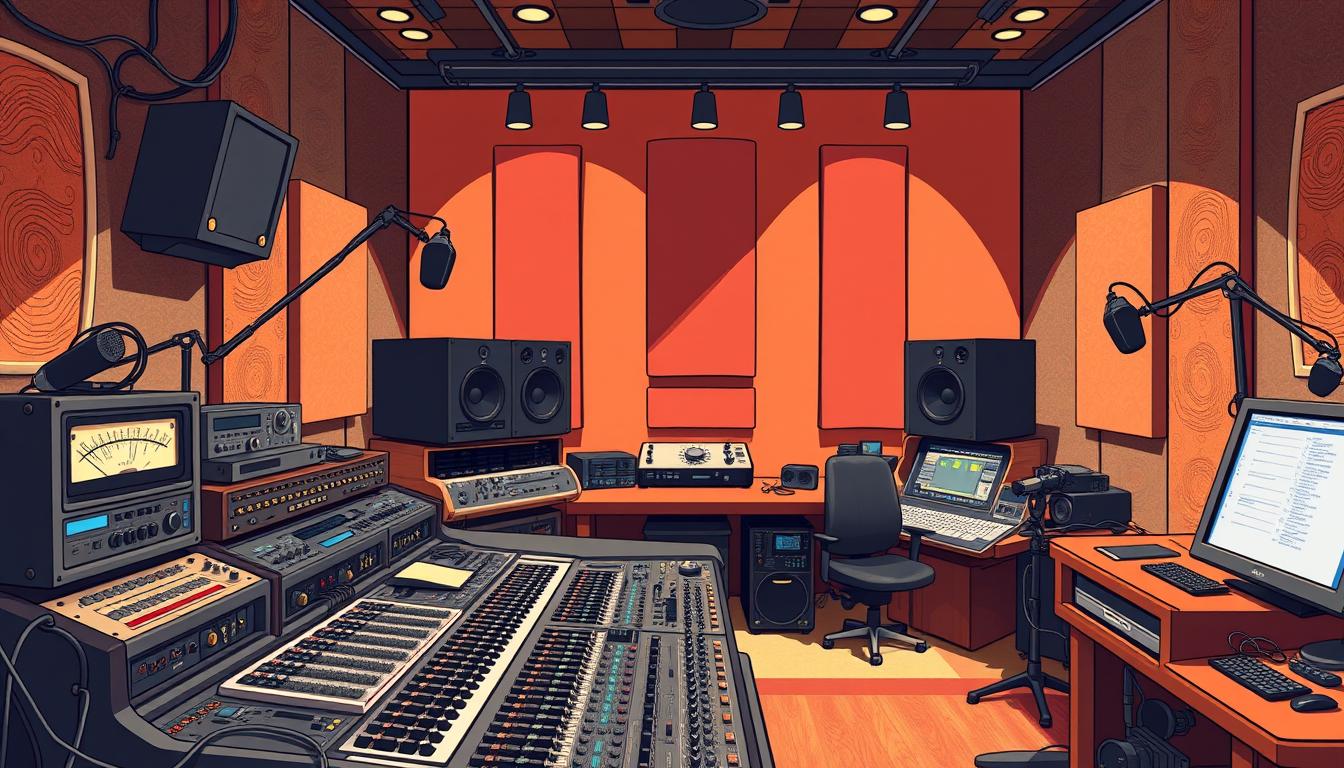Audio Mastering: The Unsung Hero of the Music Industry
Ever wondered why some songs sound so clear and others don’t? The answer is audio mastering. It’s a key step in music production that can turn a good song into a great one.
Audio mastering connects a mix to a commercial release. Skilled engineers use their knowledge to improve sound quality. They make sure your favorite songs sound great on any device.
In music production, mastering engineers are the real heroes. They use their technical skills and creativity to perfect tracks. Their work is essential for modern music, but often goes unnoticed by listeners.
Key Takeaways
- Audio mastering is the final stage in music production
- Mastering engineers enhance sound quality and consistency
- The process involves technical skills and creative decisions
- Mastering affects how music sounds on different playback systems
- It’s a crucial step for creating professional-sounding releases
Introduction to Audio Mastering
Audio mastering is the final step in music production. It makes raw tracks into polished, ready-for-radio hits. This stage makes sure your songs sound great everywhere.
Defining Audio Mastering
Audio mastering is the art of fine-tuning mixed tracks. It makes sure an album sounds cohesive. Mastering engineers tweak the sound to make it perfect for all systems.
The Importance of Mastering in Music Production
Mastering is key for professional-sounding music. It balances sound levels, adjusts loudness, and widens the stereo sound. Without it, even the best mixes can sound off.
| Frequency Range | Hz |
|---|---|
| Low End | 20-250 |
| Mid Range | 250-4000 |
| High End | 4000-20000 |
Historical Evolution of Audio Mastering
Audio mastering has changed a lot. It began with simple adjustments for vinyl records. Now, it uses advanced digital techniques. Tools like the Abbey Road TG Mastering Chain have changed the game.
“Mastering is the bridge between the studio and the listener’s ears.” – Bob Katz, Mastering Engineer
As technology gets better, so does audio mastering. It’s still a crucial step in making music that stands out in today’s world.
The Technical Backbone of Music Production
Sound engineers are the heart of music production. They capture and shape sound to fit the artist’s dream. Their work begins before the artist steps into the studio, with important setup tasks.
They pick the right microphones, set up mixing consoles, and use digital audio workstations. Their knowledge in Digital Signal Processing helps them improve acoustics and adjust sound levels.
Mixing and Mastering are key in music production. Mixing engineers mix tracks, adjust levels, and add effects for a unified sound. Mastering engineers then enhance these mixes with EQ, compression, and limiting.
“Music production is a blend of art and science, balancing artistic vision with technical skills to create captivating auditory experiences.”
The music industry has grown to use more technology for audio mastering. This shows how advanced tools are now part of the production process. Here are some important parts of modern music production:
- Use of digital audio workstations (DAWs)
- Application of virtual instruments
- Implementation of advanced sound processing software
- Collaboration between producers, artists, and engineers
| Production Stage | Key Tasks | Tools Used |
|---|---|---|
| Pre-production | Equipment setup, acoustics optimization | Microphones, mixing consoles |
| Recording | Capturing audio, level adjustment | DAWs, audio interfaces |
| Mixing | Balancing tracks, applying effects | Mixing software, plugins |
| Mastering | Final polishing, format preparation | Mastering software, analyzers |
Audio Mastering: The Final Touch in Sound Engineering
Audio mastering is the last step in music production. It combines technical skill and artistic vision for a polished sound. Let’s explore how mastering impacts the music we love.
The Art and Science of Mastering
Mastering is a mix of technical knowledge and creative insight. Engineers use EQ to adjust frequencies and make each track stand out. They also use compression to control volume and add punch.
Tools and Techniques in Audio Mastering
Mastering engineers use equalizers, compressors, and limiters. These tools improve sound quality and adjust levels. The goal is to make tracks sound great on any system, from high-end stereos to smartphones.
The Impact of Mastering on Sound Quality
Quality mastering is key for a track’s success. It ensures consistency and meets standards for volume and clarity. For DJs and producers, mastered tracks offer a competitive edge, delivering the best loudness and punch.
| Service | Starting Price |
|---|---|
| Basic Mastering | $50 |
| Mixing and Mastering Package | $155 |
| Stem Mastering | $100 |
| Dolby Atmos Mixing and Mastering | $300 |
From basic to advanced Dolby Atmos services, mastering can elevate your music. It’s an investment in quality, consistency, and listener engagement.
The Creative Aspect of Sound Engineering
Sound engineering is more than just technical skills. It’s an art that combines creativity with precision. Audio mastering, a key part, needs a sharp ear and a creative eye. Engineers bring music to life by shaping its sound.
In the studio, sound engineers work hand in hand with artists. They make important decisions that shape the music. From making vocals clear to enhancing bass, their choices deeply affect the music’s feel. This teamwork is essential for creating a unified final product.
The mixing and mastering stages are where engineers show their creativity. They fine-tune each element, making sure every sound stands out. It’s a careful balance of sound levels and frequencies. Their aim is to create a sound that grabs the listener’s attention.
“Sound engineering is where science meets art. We’re the invisible hands that sculpt the soundscape.”
Modern audio mastering has grown with technology. Today’s engineers use advanced tools, but their artistic insight is still crucial. They adjust tracks for various playback systems, from online streams to vinyl. This flexibility is vital in today’s music world.
The creative side of sound engineering makes human professionals unique. While AI mastering tools exist, they can’t match the detailed decisions of skilled engineers. Sometimes, the best choice is to leave things as they are – a decision only a human can make.
Mastering for Different Genres and Platforms
Audio mastering changes with each music style and how it’s shared. Pop, classical, and more each need special care. Also, sound quality for streaming and vinyl records is key.
Genre-Specific Mastering Techniques
Each genre gets its own EQ tweaks. Pop music loves high frequencies, while rock aims for a balanced sound. Electronic music needs to control the low bass.
Classical music wants clear sound, jazz adds warmth, and hip-hop boosts the bass and vocals.
Adapting Mastering for Streaming Services
Platforms like Spotify and Apple Music aim for -14 LUFS loudness. Going louder can make your music quieter. True peak levels are set at -1 dBTP to avoid digital distortion.
Pop music on Spotify might aim for -6 LUFS short-term to stand out.
Mastering for Vinyl vs. Digital Formats
Vinyl mastering must watch out for bass to avoid skipping. Vinyl can handle up to -9 LUFS short-term. Digital formats, however, can go louder and offer more stereo imaging options.
| Format | Loudness Target | Peak Level | Special Considerations |
|---|---|---|---|
| Streaming | -14 LUFS | -1 dBTP | Volume normalization |
| Vinyl | -9 LUFS max | Varies | Careful bass management |
| Digital (General) | Flexible | -0.1 dBTP | Wide stereo imaging possible |
The Role of Mastering Engineers in Live Performances
Mastering engineers are key in live shows, combining Sound Engineering with Audio Post-Production. They make sure everyone hears the music clearly, making fast decisions that can change the show.
These experts think about how sound works in different places and where to put speakers. They adjust sound levels as they go, dealing with each venue’s unique problems. Their fast thinking is essential for solving unexpected issues during live events.
Sound Engineering for live events is different from studio work. Mastering engineers must handle crowd noise, weather, and changing stage setups. They use special tools to keep an eye on and tweak the sound constantly.
“Live mastering is like conducting an orchestra of sound in real-time. Every venue is a new instrument, and every performance a unique composition.”
Audio Post-Production skills are also used. Engineers often record live shows for editing and sharing later. This shows how flexible modern Sound Engineering needs to be.
The work of skilled mastering engineers greatly affects live performances. They help artists connect with their audience by providing clear, balanced sound. Their efforts make sure the energy and emotion of live music reach the listeners perfectly.
The Future of Audio Mastering
Audio mastering is changing fast with new tech. Digital Signal Processing (DSP) is pushing sound engineering limits. The future of audio mastering is exciting, with many new developments coming.
Emerging Technologies in Mastering
Spatial audio is changing how we listen to music. It creates 3D soundscapes, improving virtual reality and gaming audio. Apple’s AirPods Pro shows this tech, offering studio-quality sound to everyone. Mastering engineers are learning to work with these new formats.
AI and Machine Learning in Audio Mastering
Artificial Intelligence is big in audio production. AI tools like AIVA can make music and adjust sound levels. These changes are helping mastering engineers predict trends and work more efficiently.
The Evolving Skill Set of Mastering Engineers
Today’s mastering engineers need both technical skills and creativity. They use advanced plugins to mimic old hardware and create complex sounds. With more computing power, they can handle more tracks and high-resolution audio without delays.
| Era | Technology | Impact on Audio Mastering |
|---|---|---|
| 1940s | Tape Recording | Emergence of “transfer engineers” |
| 1950s | Vinyl Records | Use of EQ and compression techniques |
| 1980s | Digital Formats (CD) | Improved sound dynamics and loudness |
| 2020s | AI and Spatial Audio | Immersive sound experiences and automated mastering |
Looking ahead, audio mastering will keep combining art and science. Engineers are leading the way in new audio tech, making sure music sounds great everywhere.
The Impact of Quality Mastering on Artist Success
Quality mastering is key to an artist’s success in the music world. It makes tracks sound better, helping them stand out. This final step in music production makes songs ready for release.
Mastered audio files bring many benefits to artists:
- Improved sound quality across different playback systems
- Enhanced dynamics and tonal balance
- Consistency in sound across albums or EPs
- Better compatibility with streaming services and radio
These benefits can lead to more audience engagement and better marketability. Well-mastered tracks are more likely to get distribution deals and radio airplay. This is crucial for an artist’s growth and recognition.
“Professional audio mastering is the key to unlocking an artist’s true potential in the music industry.”
Quality mastering does more than just improve sound. It also helps with an artist’s branding and professional image. When listeners hear high-quality tracks, they are more likely to become loyal fans and support the artist’s career.
In today’s digital age, online mastering services make professional mastering easier for independent artists. These services offer affordable solutions and quick turnaround times. This lets artists compete with major labels in sound quality.
Investing in quality mastering can make a big difference. It can turn a good track into a great one. This can significantly influence an artist’s path to success in the music industry.
Conclusion
Audio mastering is key in music production, combining technical skill with creative touch. It started with magnetic tape in the 1940s and has grown a lot since then. The move to digital in the 1990s brought more precision and creativity to mastering.
Mastering engineers are vital in shaping music’s final sound. They use techniques like equalization and compression to improve audio quality. Their work makes sure music sounds great on different platforms.
The future of audio mastering looks bright, with technology improving but the human touch staying important. Mastering needs technical skills and a great ear for music. This mix of science and art is crucial in the music world, shaping the sounds we hear every day.
Source Links
- What Is Song Mastering / Music Mastering & Why Is It Important?
- What is Mastering a Song? Why Is It Important for Music Producers?
- Mastering Engineers: Elevating the Sonic Essence of Music Production
- An Introductory Overview to Mixing and Mastering
- Audio Mastering Essentials | Courses – Waves Audio
- Audio Mastering Techniques
- The Art and Science of Music Production: Crafting Timeless Sounds Introduction – Wisseloord
- Mastering the Art of Music Production: Techniques and Tips
- Uncovering Why Audio Engineering is Crucial to Your Song
- What is Mastering? A Guide to the Final Touch
- All services provided by Major Mixing – Mixing and Mastering | Major Mixing
- Sound Engineering: The Art of Music Recording and Mixing
- What Do Mastering Engineers Actually Do?
- Should You Master for Different Digital Platforms? Read This to Decide. – Audio Issues
- Mastering for Different Mediums: Streaming, Club, CD, and Vinyl
- The Nuances of Mastering Different Genres
- Mastering Music: A Century Of History – Sonarworks Blog
- Mastering Engineers: What They Do and When to Hire One
- Mastering Matters: What is Mastering?
- The Future of Audio Mastering – Ernie Gray
- The Future of Audio Engineering – Mastering.com
- The Evolution of Professional Mixing and Mastering – Mix & Master My Song
- Unveiling the Magic: The Art and Science of Music Mastering
- Demystifying the Audio Mastering Process: What You Need to Know | C&I Studios
- Why Professional Audio Mastering Is Important For Musicians Bands Artists And Labels – Solar Heavy Studios
- Mastering (audio)
- Group 9 Audio Mastering Conclusions Pt. 2







